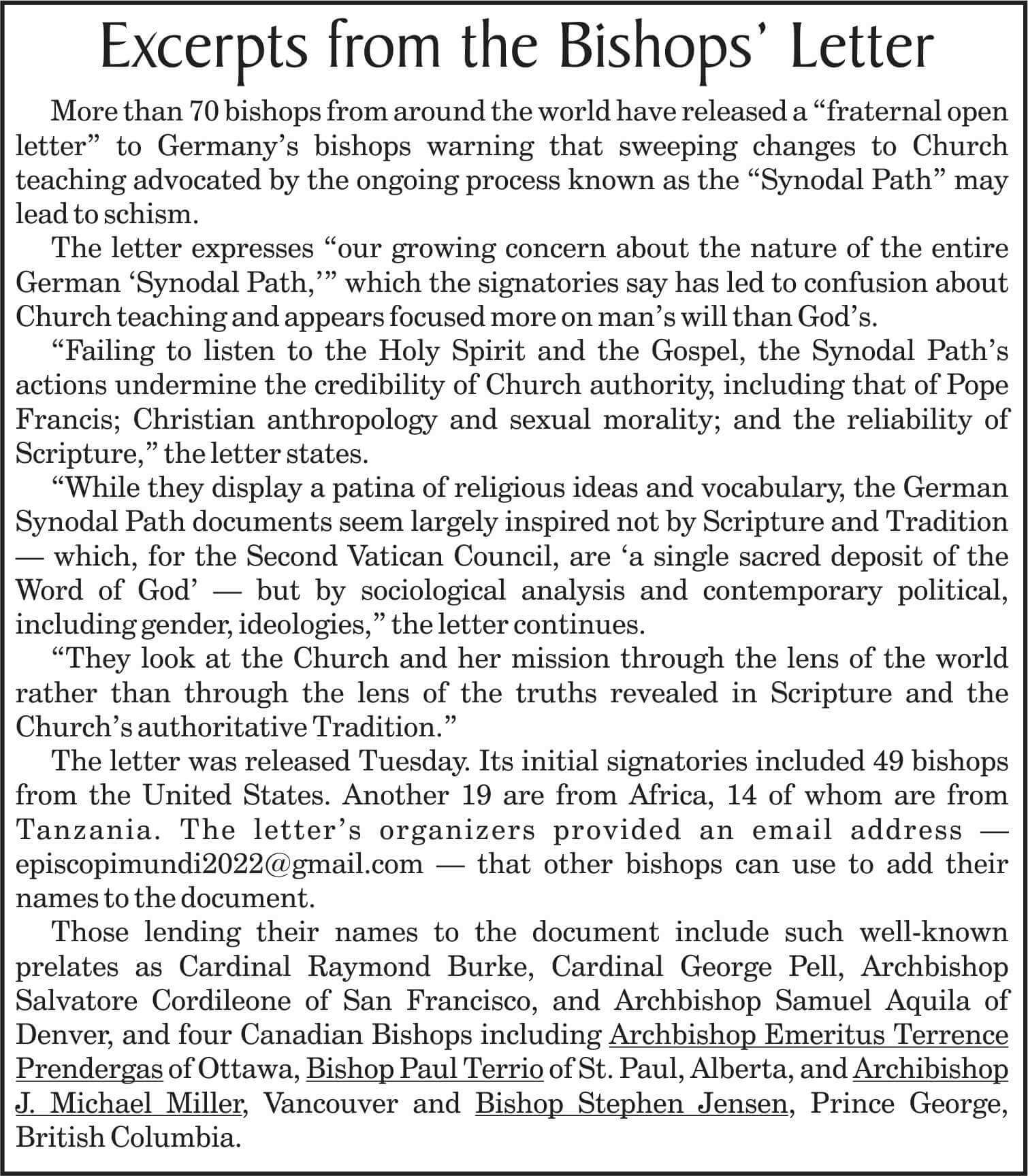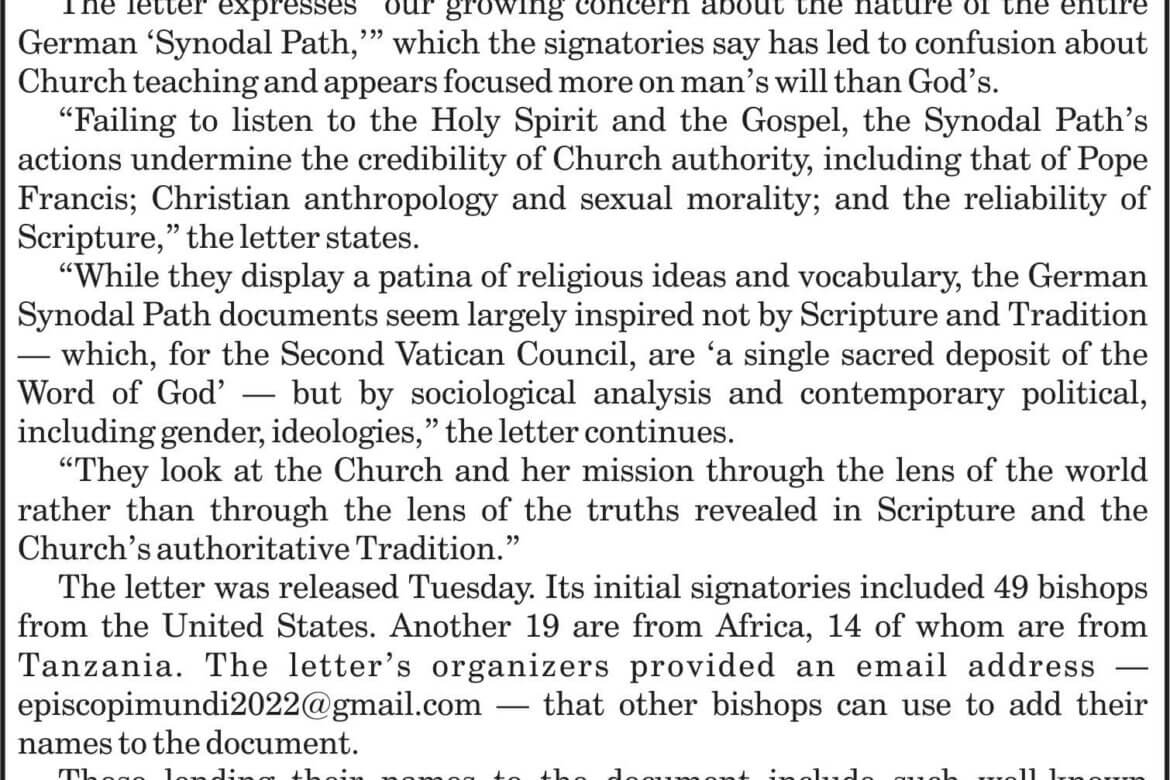Letter Sent to Four Canadian Bishops by Dignity Canada
Frank Testin, Toronto
Volume 37 Issue 4, 5 & 6 | Posted: July 16, 2022

Your Excellency, Archbishop Emeritus Prendergast:
Re. “A Fraternal Open Letter to Our Brother Bishops in Germany: April 11, 2022
I am writing to you as one of the four Canadian bishops who initially signed the open letter to the Catholic bishops in Germany, taking issue with the direction which the Synodal Path is taking in that country and the contents of its various documents.
Metaphorically, the letter places on a pedestal Magisterial teaching and authority and traditional ways of interpreting Scripture. Such emphases, however, can be incomplete and misleading. At several points the letter expresses concern about the “world” as if all experience, including the lives and loves of church members, and scientific findings are not trustworthy; moreover, the “world” is pictured to be unholy and godless. Instead, my namesake, Francis of Assisi, as well as other Catholic mystics spoke of the Divine indwelling in all of Creation. Teresa of Avila recognized that Christ has no hands, no feet, no eyes on earth but ours. In part, Jesus as Lord and Saviour lives in you and me… and the rest of Creation.
I submit that St. Paul’s caution “Do not be conformed to this world.” is better translated/interpreted as the systems of oppression that lead to mass poverty, dehumanization, militarism and authoritarianism. This would be more consistent with the teachings of Jesus who was an outspoken critic of the Roman Empire’s occupation and the religious abuses of His day which dehumanized the vast majority of the poor in Palestine. Finally, I recall the phrase: “God saw everything that he had made, and indeed, it was very good.” (Genesis 1:31)
Why would we want to dismiss individual experiences and consciences, and scientific discoveries? Truth is truth, and as a community we would be remiss in not considering tradition, scripture, experience (including scientific knowledge) and reason together. We submit that all of these avenues should be taken into account in the development of all Church teachings. The letter of April 11th unfortunately only considers two of these paths.
The tone, if not the substance, of the letter is that Church teaching on faith and morals is without error and therefore cannot be changed. That is historically incorrect, and I give a few examples:
1. Church teaching approved the institution of slavery for many centuries. Even Paul’s letter to Philemon did not challenge the institution of slavery. Various Church bodies have owned slaves. Supporting the abuse of fellow human beings in this fashion is now seen as ethically wrong. The experiences, the consciences, of Church members revealed that slavery is contrary to Jesus’ basic teaching of Love and the equality of all persons who are temples of the Holy Spirit. Further, as you know, the so-called Doctrine of Discovery enabled the cultural genocide of many indigenous peoples here and elsewhere by European conquerors. I trust that Pope Francis will repudiate that doctrine when he travels to Canada this year.
2. The Magisterium taught that the Jewish people were responsible for the death of Jesus. The Church supported the oppression of Jewish peoples over the centuries. Finally, at Vatican II, this teaching was repudiated.
3. For many centuries, the Church taught that it alone held the keys to salvation. Again, at Vatican II, this teaching was revoked. It was an incredibly arrogant position that Jesus would never have embraced. As a young person before Vatican II, this teaching caused me to look down on my protestant neighbours and see them as “less than”.
4. For centuries, the Church supported capital punishment for the most egregious crimes. This was changed by St. Pope John Paul II in 1995 who maintained that capital punishment is never justified.
5. For centuries the Magisterium prohibited profiting from loans. This gradually faded away as capitalism grew in Europe during the Renaissance.
Dignity Canada Dignité applauds the efforts made by the Catholic Church in Germany to reconsider its teachings on sexual ethics. It’s my understanding that St. Augustine placed much weight on the Sodom story in the Hebrew bible (Genesis 19:1-38) as a condemnation of homosexual activity, which even Jesus described in a very different light (Matthew 10:13-15; Luke 10: 10-12). We are confident that the Holy Spirit has opened the hearts and minds of those participating in the German Synodal process. We pray that Synodal processes in other countries will also be open to the breath of the Spirit.
Yours truly,
Frank Testin
President, Dignity Canada Dignité
president@dignitycanada.org
Frank Testin, Toronto

